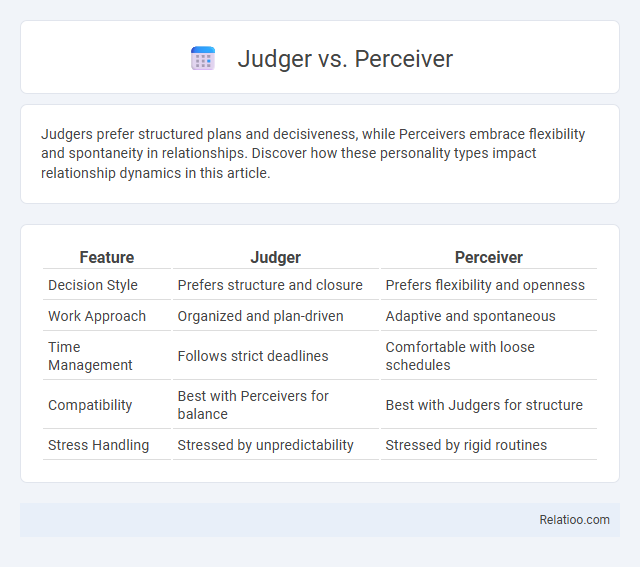Judgers prefer structured plans and decisiveness, while Perceivers embrace flexibility and spontaneity in relationships. Discover how these personality types impact relationship dynamics in this article.
Table of Comparison
| Feature | Judger | Perceiver |
|---|---|---|
| Decision Style | Prefers structure and closure | Prefers flexibility and openness |
| Work Approach | Organized and plan-driven | Adaptive and spontaneous |
| Time Management | Follows strict deadlines | Comfortable with loose schedules |
| Compatibility | Best with Perceivers for balance | Best with Judgers for structure |
| Stress Handling | Stressed by unpredictability | Stressed by rigid routines |
Understanding Judger vs Perceiver: Definition and Overview
Judgers prefer structure, organization, and decisiveness, often valuing planned approaches and clear deadlines, while Perceivers embrace flexibility, spontaneity, and adaptability, thriving in open-ended scenarios and last-minute changes. Understanding Judger vs Perceiver differences helps you navigate communication and workflow by recognizing how each mindset uniquely processes information and prioritizes tasks. This perspective shift enhances collaboration by aligning expectations with individual cognitive styles, leading to improved efficiency and mutual respect.
Core Differences Between Judgers and Perceivers
Judgers prefer structured environments with clear plans and deadlines, valuing organization and decisiveness, while Perceivers thrive in flexible settings, embracing spontaneity and openness to new information. Your approach to decision-making reveals this core difference: Judgers seek closure quickly, whereas Perceivers prefer to keep options open as long as possible. Understanding this contrast helps you navigate how you manage time, tasks, and adapt to changing circumstances.
Traits and Characteristics of Judgers
Judgers exhibit strong organization, decisiveness, and a preference for planning, valuing structure and closure in both personal and professional settings. They tend to be goal-oriented, reliable, and prefer making firm decisions rather than keeping options open. Your productivity benefits from their commitment to schedules and clear expectations, making Judgers natural leaders in environments requiring order and predictability.
Traits and Characteristics of Perceivers
Perceivers are characterized by their adaptability, spontaneity, and preference for keeping options open rather than finalizing decisions quickly. You tend to thrive in environments that allow flexibility and are energized by exploring new information and possibilities. This trait often leads Perceivers to display creativity, openness to change, and a tendency to procrastinate until the right moment for action arises.
Decision-Making Styles: Judger vs Perceiver
Judger decision-making styles emphasize structure, organization, and planned approaches, leading to quick and decisive outcomes based on clear criteria and deadlines. Perceiver decision-making styles favor flexibility, adaptability, and openness, allowing for exploration of alternatives and postponing decisions to gather more information. Understanding the shift from Judger to Perceiver perspectives highlights how individuals balance decisiveness with adaptability, which impacts problem-solving efficiency and response to changing environments.
Time Management Approaches for Judgers and Perceivers
Judgers typically prefer structured time management approaches, relying on detailed schedules, clear deadlines, and prioritized task lists to maintain control and predictability. Perceivers, on the other hand, favor flexible time management strategies that accommodate spontaneity and adaptability, often using broad frameworks or time blocks rather than rigid plans. Shifting perspective between Judger and Perceiver styles can enhance time management by blending the Judger's emphasis on organization with the Perceiver's openness to changing circumstances.
Communication Styles in Judgers and Perceivers
Judgers prefer structured and direct communication styles, emphasizing clarity, deadlines, and definitive decisions to maintain order and predictability. Perceivers favor flexible, open-ended communication that allows for spontaneity and exploring multiple possibilities before concluding. This difference often leads to perspective shifts where Judgers seek closure in conversations, whereas Perceivers prioritize adaptability and ongoing dialogue.
Workplace Dynamics: Judger vs Perceiver
Judgers in the workplace thrive on structure, deadlines, and clear expectations, often excelling in project management and task completion. Perceivers, however, adapt fluidly to changing priorities and remain open to new information, fostering innovation and problem-solving in dynamic environments. A perspective shift that balances Judger decisiveness with Perceiver flexibility enhances team collaboration and responsiveness to evolving business challenges.
Relationships and Compatibility: Judgers with Perceivers
Judgers value structure, planning, and decisive actions, which can clash with Perceivers' preference for flexibility, spontaneity, and adaptability in relationships. Compatibility between Judgers and Perceivers thrives when both parties respect and balance these differing approaches, fostering mutual understanding and open communication. Perspective shifts enable Judgers to embrace uncertainty and Perceivers to appreciate order, enhancing overall relationship harmony and growth.
Tips for Embracing Both Judging and Perceiving Traits
Balancing Judger and Perceiver traits enhances your adaptability and decision-making skills by blending structure with flexibility. Embrace scheduled spontaneity to satisfy your need for order while allowing room for creativity and exploration, ensuring both planning and openness coexist. Regularly practicing mindfulness can help you shift your perspective, enabling you to recognize when to apply judgment or perception depending on the context.

Infographic: Judger vs Perceiver
 relatioo.com
relatioo.com